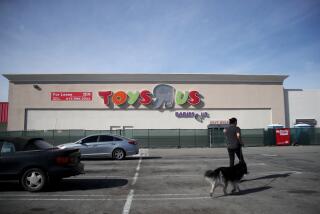Zellerbach Preps for âBattle Royaleâ : Company Gearing Up to Fight Goldsmith Takeover Bid
SAN FRANCISCO â An executive of Crown Zellerbach, the forest-products giant that is the latest target of Anglo-French corporate raider Sir James Goldsmith, is still haunted by a sight he saw on a recent business trip to New York.
âI was walking down the street and I saw the old headquarters of Diamond International Corp.,â the forest-products and packaging concern that Goldsmith acquired in 1982 and later dismembered. âIt looked like a very lonely place.â
For this executive, the sight of Diamond Internationalâs deserted offices drove home what he feels is a simple truth: that Crown Zellerbach, a 115-year-old fixture of the West Coast business community, is engaged in a fight for its corporate life. Occupants of the companyâs landmark Bauhaus-inspired headquarters building here are hunkering down for a long siege.
Last week, Goldsmith threatened in a letter to Zellerbach to begin a proxy fight if Zellerbachâs directors donât dismantle an elaborate anti-takeover defense that they installed last July.
Goldsmith, who holds an 8.6% stake in Zellerbach, said heâd contest managementâs nominees for Zellerbachâs board of directors if Zellerbachâs directors fail to act by the close of business today to neutralize the companyâs so-called poison pill, which would increase the cost of a hostile takeover. Zellerbachâs board, unimpressed by the deadline, will meet Wednesday to consider Goldsmithâs letter.
Goldsmithâs threat was coupled with an offer to acquire Zellerbach, which owns or controls about 2 million acres of prime U.S. timberland, for at least $1.13 billion, or $41.625 a share. Goldsmith hasnât yet revealed any detailed plans for Zellerbach, but company officials fear Zellerbachâs fate would be similar to Diamondâs.
In a sharply worded statement, the company defiantly vowed that it wouldnât be âhurried, bullied or intimidated.â Earlier, Zellerbach Chairman and Chief Executive William T. Creson insisted that the company wouldnât buy back Goldsmithâs shares at a premium, a practice known in the mergers-and-acquisitions game as paying âgreenmail.â
Last year, a group headed by Goldsmith won a $50-million premium when it sold its 9% stake in St. Regis Corp. back to the company; St. Regis was later acquired by Champion International. Other forest-products companies also have been taken over by investors seeking undervalued assets.
In its attempt to avoid a similar fate, Zellerbach has hired some of the biggest guns in the mergers-and-acquisitions field--including lawyer Martin Lipton, investment banker Salomon Bros. Inc. and public relations man Gershon Kekst--to orchestrate its defense.
The showdown between Goldsmith and Zellerbach is shaping up as a âbattle royale,â says George B. Adler, first vice president and a forest-products analyst for Smith Barney, Harris Upham & Co. Adler thinks that Goldsmithâs bid has put Zellerbach up for grabs--or âinto playâ in takeover parlance--and that the company will eventually be sold for more than $50 a share.
âThere are already buyers lined up for various parts of Crown Zellerbach,â Adler says.
Goldsmith, a flamboyant financier whose career began at the age of 20 when he paid $200 for the rights to peddle a British rheumatism cream in his native France, can be a tenacious opponent. It took him more than two years to wear down Diamond International. His global financial empire includes the French news weekly LâExpress, oil reserves in Guatemala and a 40% interest in the Aspinall gambling casinos in Britain.
His biggest holdings in the U.S. are Grand Union, an East Coast supermarket chain, and about 1.7 million acres of timberland that remained after he took Diamond International apart and sold off its various divisions.
Zellerbach, his latest target, is a once-sluggish company that has undergone radical surgery of its own since Creson moved up to the top spot more than three years ago.
Pared Product Line
Under Creson, Zellerbach has lopped off 9,000 of 28,000 employees, sold its money-losing Canadian operations and pumped $800 million into desperately needed mill modernizations. The company also has negotiated productivity improvements and long-term labor peace in five- and six-year union contracts.
Creson also pruned Zellerbachâs product line to eliminate such low-margin commodities as newsprint, pulp and kraft paper, which is used to make brown paper bags.
The 55-year-old executive also de-emphasized timber and wood products and poured resources into pursuing more lucrative markets for white business papers, coated printing papers and towel and tissue products.
(Zellerbachâs brands, which include Marina and Chiffon toilet paper, Nice ân Soft tissues and Spill Mate paper towels, have the largest market share in the West Coast towel and tissue market.)
And, in an attempt to capitalize on the $5-billion market for computer and office-automation supplies and accessories, Creson in 1983 formed a new unit called Eczel Corp. to distribute ribbons, floppy disks, print wheels, cables, modems and computer furniture.
The business, an outgrowth of Zellerbachâs longstanding role as a supplier of papers for business forms and computer printouts, has long-term potential but resulted in a hefty $19 million in start-up costs last year.
Despite Cresonâs strategic initiative, the companyâs earnings have remained lackluster. Zellerbach posted net income of $86.9 million, or $2.61 a share, in 1984, down slightly from a year earlier, as improved earnings from paper, container, specialty packaging and distribution operations were offset by depressed conditions in the timber and wood industry.
Analysts say Creson inherited a company that had been severely weakened by years of mismanagement. His predecessor, C. R. Dahl, who retired in 1981 at the age of 60, skimped on capital improvements and left Zellerbach saddled with some of the most antiquated mills in the industry, critics say.
One of Cresonâs first acts was to get the board to slash the dividend on common stock in order to divert cash toward capital spending. The dividend was cut 57% to a $1-a-share annual rate from the previous $2.30. Though it served its purpose, the move made Zellerbach shareholders restive and added to the companyâs vulnerability to a hostile takeover.
Ironically, Cresonâs radical makeover of the company may have made Zellerbach a more tempting target for corporate raiders.
âMy surmise is that the likes of Sir James recognize that most of the major surgery has taken place and that the companyâs earnings potential is in place,â says one source close to Creson.
Creson himself declined requests for an interview. But, in a speech last month, he said, âAny external effort at this stage of our strategic program to capture our undervalued assets at the expense of greater future opportunities is a distinct disservice which may deny our shareholders the chance to realize the full value this company offers.â
Elaborating on that sentiment, a Zellerbach strategist contends that âif a raider were to take over the place and break it up and sell it off, heâd have to do it at forced-sale prices. . . . A raider using junk bonds and paying high interest rates wouldnât have the staying power to hold out for top dollar.â (Junk bonds are a form of high-yielding debt that is generally used to finance more risky ventures.)
Zellerbach, on the other hand, has had 700,000 acres of ânon-strategicâ trees up for sale for 18 months now. âWeâre not under pressure to sell at any price,â the strategist said.
Goldsmith is seeking Zellerbach at a time when the paper industry may be on an upswing.
Prices for white business paper peaked at $785 a ton last year before dropping to their current level of $620 a ton. Although demand remained high while the price was falling, the strong dollar gave foreign producers a cost advantage and they flooded the U.S. market.
âDisaster Areaâ
Thatâs changing. In the past month, the dollar has lost about 10% of its value when measured against other major currencies. International Paper just posted a $60-a-ton price increase for white paper, effective May 1, and industry insiders are cautiously optimistic that the price hike will stick.
Timber and forest products âremain a disaster area,â a Zellerbach official said. The company has shifted almost all of its lumber production from the high-wage Pacific Northwest to the Southeast, where raw materials also cost less. One exception: a small pilot mill in Warrenton, Ore., that is cutting lumber to metric sizes for export to Pacific Rim nations.
And, while Zellerbach has invested over $425 million to modernize its sprawling Camas, Wash., paper mill, analysts say the company must invest at least another $1.5 billion to upgrade its other major installations.
With these challenges, the last thing Zellerbachâs officials need is a distracting takeover battle. Zellerbach is hoping to convince shareholders that current management offers them the best chance for the long-term appreciation of their investments.
They also are apparently counting on the shareholder rights poison pill to ward off Goldsmith and others, but takeover experts say thatâs no sure bet. The rights give Zellerbach holders the ability to buy two shares of the surviving company after a hostile takeover for the price of one.
Might Zellerbach seek a âwhite knightâ friendly takeover if its posion-pill defense fails? Zellerbachâs officials say theyâre not looking for one. But if they decide to, Sir James Goldsmith has one in mind.
âIâm white,â the corporate raider recently quipped, âand Iâm a knight.â
More to Read
Inside the business of entertainment
The Wide Shot brings you news, analysis and insights on everything from streaming wars to production â and what it all means for the future.
You may occasionally receive promotional content from the Los Angeles Times.










